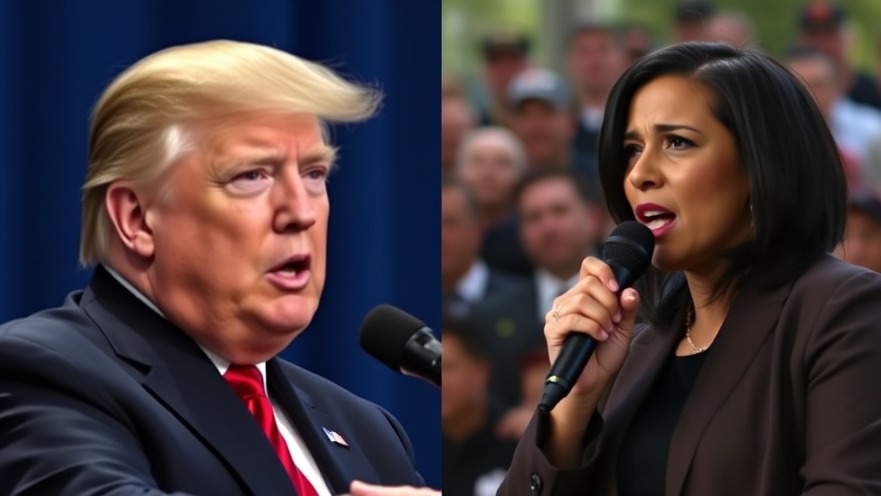
Trump's Categorical Insults Showcase a Deeper Fear?
In recent exchanges that have captured significant media attention, Rep. Jasmine Crockett has asserted that former President Donald Trump's derogatory remarks toward her reflect a deeper-rooted fear of "smart, bold Black women." This claim follows Trump's inflammatory comment, labeling her as having a 'low IQ,' which has sparked discussions about the intersection of race, gender, and political discourse in the public sphere.
Crockett's response did not shy away from confrontation. She remarked, "For you to be in charge of the WHOLE country, you sure do have my name in your mouth a lot," aptly highlighting the repeated nature of Trump's attacks not just on her, but also on numerous figures within the Democratic Party. This incident invites a timely examination of how political rhetoric can perpetuate stereotypes and fuel divisive narratives.
The Sociopolitical Implications of Trump's Comments
Trump's comments resonate beyond individual insult; they reflect longstanding societal patterns where women, particularly women of color, face systemic derision. Historical context supports this notion; Black women in leadership positions often face scrutiny that their white male counterparts do not. This disparity raises critical questions about representation in politics and the broader implications for voter behavior and community engagement.
Crockett’s prominent positioning within her district in Texas serves as a counter-narrative to the often outdated stereotypes perpetuated by certain political figures. Her emphasis on intelligence and boldness in leadership lends itself to empowering a new generation of leaders who navigate complex societal issues without succumbing to derogatory dismissals.
A Counterpoint to Political Norms: Voter Engagement
The targeted comments by Trump could potentially galvanize voters who feel that their voices are misrepresented or marginalized. For example, the recent mid-term elections indicated a surge in Black voter turnout, particularly among women, who are increasingly becoming a formidable force in shaping electoral outcomes. Reflections of excellence and professionalism in politics, as embodied by figures like Crockett, are counterweights to superficial analyses of capability.
Historical Context: Women in Politics
Women, particularly women of color, have historically faced obstacles within the political arena. Differentiating from their male peers, their experiences are tinted with added layers of scrutiny. Leaders such as Shirley Chisholm and Kamala Harris have broken barriers within their parties, but not without experiencing personal attacks and caricatures along the way. The thread of disparaging remarks in politics can be traced far back, raising questions about how far we've come—and how much further we need to go.
Future Predictions: An Evolving Political Landscape
As we look ahead, the dynamic of political discourse will likely continue to evolve. Platforms designed to amplify minority voices may gain traction, fostering an environment conducive to change. In response to derogatory rhetoric, supporters of leaders like Crockett may resort to deeper political engagement and activism, emphasizing policy over personality.
How leaders respond to attacks will shape narratives. With a focus on collaboration rather than confrontation, a space may emerge for voices that advocate for reform, challenging traditional power structures. The potential for women leaders to reshape the political landscape is promising, indicating that Trump’s comments may backfire in ways he cannot foresee.
Final Thoughts: The Power of Perception
As the political discourse unfolds, it is essential to scrutinize comments such as those made by Trump, understanding their broader implications. The societal perception of women in leadership roles is crucial; as more individuals engage thoughtfully with political narratives, collective empowerment becomes attainable. The impact of such narratives reverberates through communities, potentially leading to profound changes in the political fabric of our nation.
In the face of belittling remarks, the resilience and intelligence of Black women leaders will continue to shine through, cultivating the next generation of politicians who will undoubtedly reshape the public dialogue.
 Add Element
Add Element  Add Row
Add Row 



Write A Comment